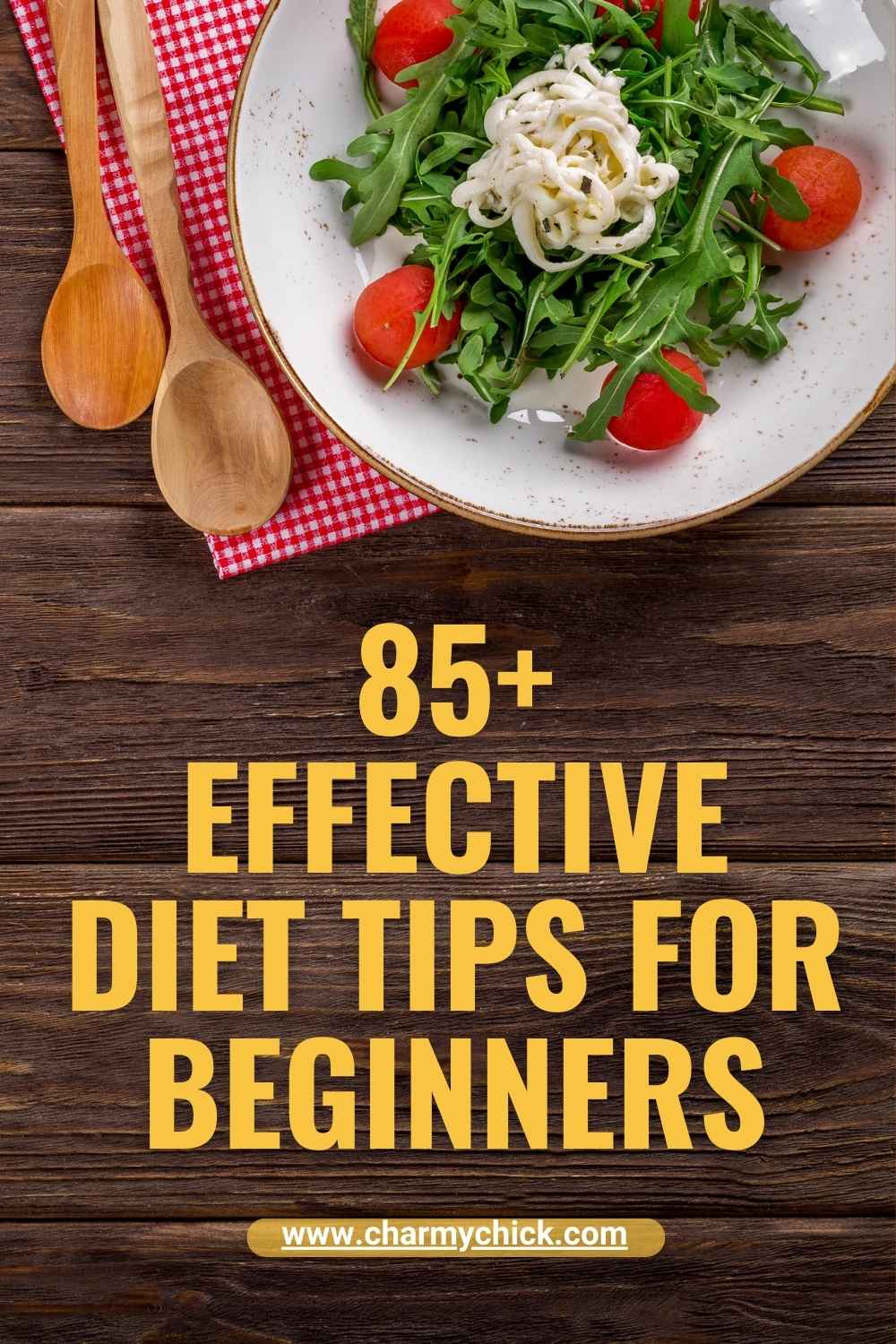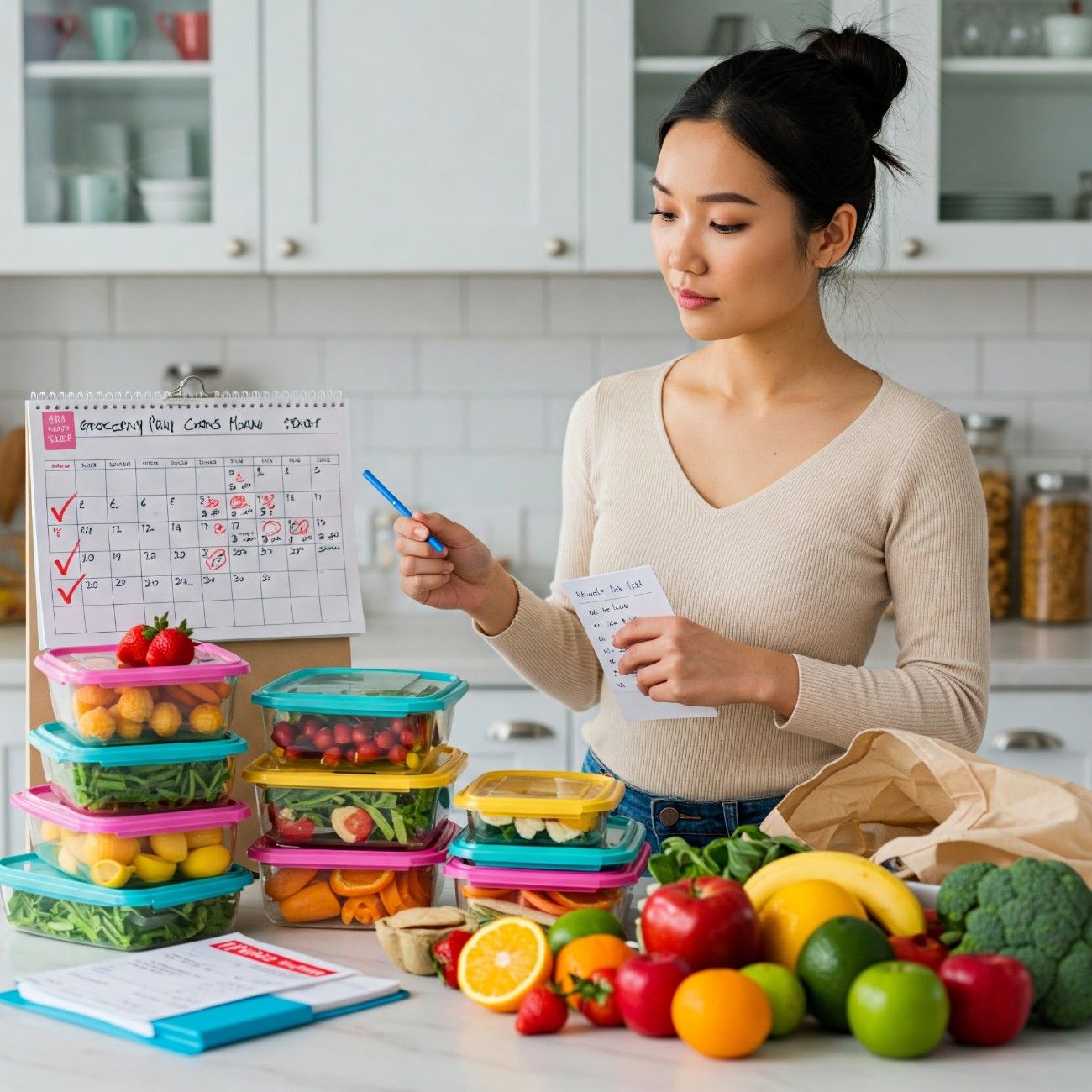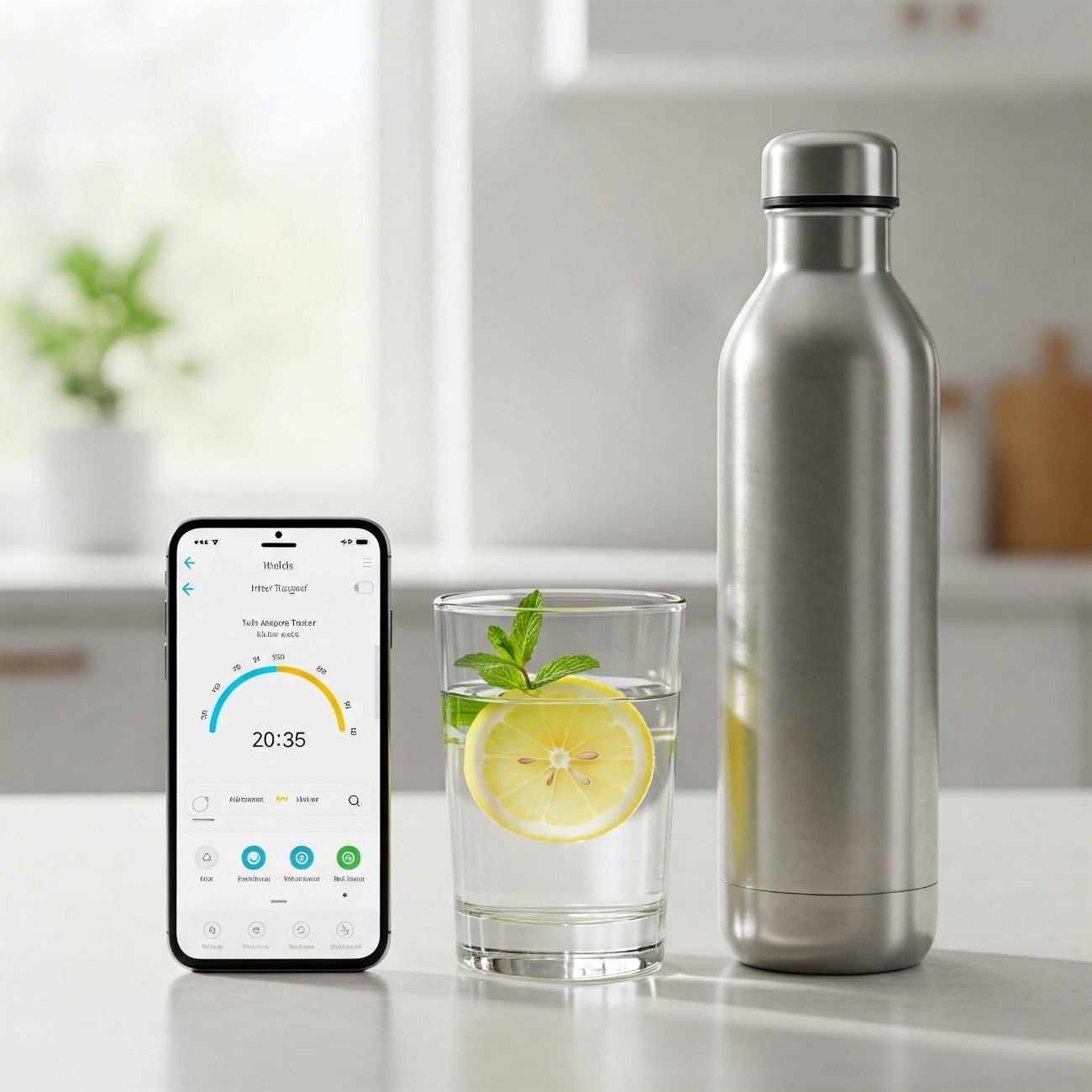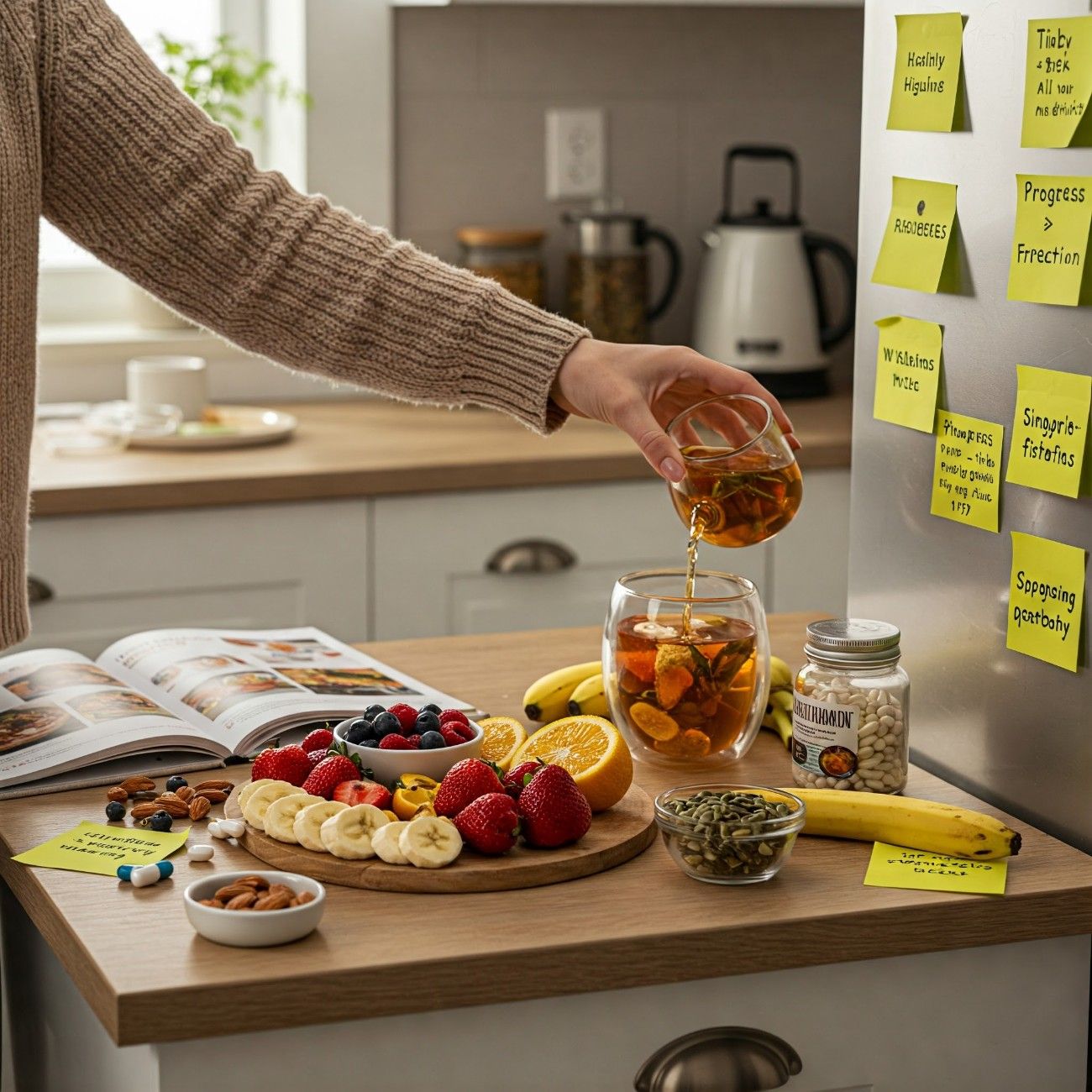It may seem intimidating to start a diet, but it doesn’t have to be. If you’re looking to lose weight, have more energy, or just simply eat better, the key is making simple changes. This handbook brings together 85+ easy diet tips for beginners organized into categories so that you can best tackle your health journey in a timely manner.
Transform Your Health with These Beginner Diet Tips
Kickstart your healthy diet with these diet tips for beginners! 🌱 Simple, sustainable changes for better health, energy, and weight loss. 🥗💪 Achieve lasting success! 🌟
Mindset and Motivation 🧠
When you start a diet, your attitude is important to your success. A positive, patient, and encouraging attitude can be the difference between success and failure. Here are some diet tips for beginners to keep you motivated:
-
Set realistic goals – Think about consistency, not perfection. It’s simple to get caught up in the notion of being perfect, but actual progress occurs when you’re consistent.
-
Know your “why” – Clearly define your reason for dieting. If it’s to be healthier, have more energy, or lose weight, knowing your underlying motivations can keep you on track.
-
Track progress – Keep journals or use apps to stay accountable. Monitoring what you eat and how you feel can help you monitor progress and remain motivated.
-
Celebrate small victories – Celebrate non-scale victories such as increased energy or better sleep. These successes can keep you motivated when the scale isn’t progressing as quickly as you wish.
-
Be patient – Long-term changes take time. Weight reduction and health changes won’t occur overnight, so remain patient.
-
Don’t compare to others – Every person is different. Don’t compare your journey to another’s. Concentrate on your progress and revel in your differences.
-
Imagine success – Make a vision board or visualization of your achievement. Visualizing where you would like to be can encourage you in difficult times.
-
Be with people who will support you – Plug into online communities or have a diet buddy. Having a friend or a group of people to encourage you can bring about a tremendous difference.
-
Forgive setbacks – That one cheat meal isn’t going to derail all your progress. Everyone has the occasional setback. It’s about getting back on track.
-
Practice kindness to yourself – Speak to yourself as you would a friend. Be kind and patient, particularly when things don’t turn out as intended.
Planning and Preparation Diet Tips for Beginners 🗓️
One of the key components of dieting is preparation and planning. The more you prepare, the better you’ll be at not making those spontaneous decisions that will ruin your chances.
-
Pre-plan meals – Minimizes impulse eating. When you know what you’re having, it’s simpler to keep it healthy.
-
Grocery shop with a list – Avoids impulse purchases. Going grocery shopping with a list means you only purchase what you require, keeping unhealthy foods out of your basket.
-
Batch cook for the week – Saves time and guarantees healthier meals. If you have pre-cooked meals prepared and ready to go, you’re less likely to reach for something unhealthy.
-
Pre-portion snacks – Don’t overeat from large packages. Pre-portioning snacks can save you from mindless eating.
-
Have healthy foods at home – Have fruits, nuts, and yoghurt available. When healthy food is available at home, you tend to make healthy choices.
-
Take reminders to eat if you forget – Particularly helpful for hectic routines. Having an alarm remind you to eat can assist you in keeping your energy levels up throughout the day.
-
Maintain a food diary – Assists in recognizing eating habits and emotional triggers. Recording what you eat can uncover patterns that are undermining your success.
-
Stockpile emergency meals – Homemade frozen meals are a saving grace. Having nutritious meals in the freezer ensures you won’t be reaching for takeout when you need it most.
-
Buy containers – Ideal for portion control and grab-and-go meals. Meal prepping and saving your meals in proper containers allows for easy grab-and-go.
-
Avoid shopping when hungry – You’re more likely to buy junk food. If you shop while hungry, your willpower weakens, and you’re more likely to make unhealthy choices.
Healthy Eating Diet Tips for Beginners 🥗
Developing healthy eating habits is key to maintaining a balanced diet. These habits can help regulate your appetite, keep your energy up, and reduce your overall caloric intake.
-
Eat slowly – Helps you recognize fullness. Eating slowly lets your body register when you’re full, so you don’t overeat.
-
Chew thoroughly – Aids digestion and satiety. Chewing more thoroughly can facilitate digestion and make you feel more full on less food.
-
Avoid eating in front of screens – Encourages mindful eating. Eating mindlessly in front of the TV or while working can result in overeating.
-
Eat at a regular time every day – Keeps metabolism steady. Eating at the same time daily assists in balancing hunger and metabolic rate.
-
Breakfast with protein – Fills you up for longer. Protein suppresses hunger, and so having it during breakfast can ward off snacking during the rest of the day.
-
Intuitive eating – Attend to hunger and fullness messages. Listen to your body cues and eat when hungry, feeling satisfied when finished.
-
Don’t skip meals – It often leads to overeating later. Skipping meals can lead to excessive hunger and poor food choices later in the day.
-
Limit late-night snacking – Try to finish eating 2–3 hours before bed. This allows your body to fully digest food and promotes better sleep.
-
Begin meals with a salad or broth soup – It lowers overall intake. These foods make you feel full without a lot of calories, resulting in a smaller meal overall.
-
Eat more at home – You have control over ingredients and portion sizes. Home-cooked meals tend to be healthier and more nutritious than eating out.
Smart Food Choices Diet Tips for Beginners🥑
Eating smart is key to long-term health. The foods you eat will power your body and affect how you feel on a daily basis.
-
Select whole over processed – Fewer sugars and additives. Whole foods such as fruits, vegetables, and grains provide more nutrients and less empty calories than processed foods.
-
Opt for whole grains – Brown rice, quinoa, and oats instead of white rice or bread. Whole grains contain more fiber and nutrients, making you feel full for a longer period of time.
-
Include vegetables in all meals – Increases nutrients and fiber. Vegetables are low-calorie but rich in vitamins, minerals, and fiber.
-
Opt for lean proteins – Chicken, turkey, fish, beans, and tofu. These protein sources contain less fat and essential nutrients.
-
Choose healthy fats – Avocados, nuts, seeds, and olive oil. Healthy fats make you feel full and are important for overall health.
-
Eat red and processed meats in moderation – Have them every now and then, not every day. They are likely to be high in saturated fat and sodium.
-
Replace soda with sparkling water or tea – Eliminates empty calories. Sugary beverages can contribute to a lot of calories without any nutrient content.
-
Use spices and herbs rather than salt – Adds flavor without sodium. Fresh spices and herbs can be used to add flavor without the health consequences of too much sodium.
-
Choose fruit instead of dessert – Natural sugar and nutrients. Fruits offer natural sugars and are full of necessary vitamins and fiber.
-
Get to know nutrition labels – Identify added sugars and unhealthy fats. Learning about nutrition labels allows you to make good food choices.
Portion Control and Timing ⏰
Portion control plays a crucial role when dieting. Taking the right portions keeps you in check with your calorie levels without depriving yourself. Refer to these diet tips for beginners for healthy diet:
-
Eat from smaller plates and bowls – Tricks brain into feeling more full. Research indicates that individuals eat less when served on small plates.
-
Feed in the kitchen, not at the table – Eliminates food second helpings. Eating away from the table helps you serve fewer portions.
-
Know your portion sizes – Practice estimating or use a food scale. Portioning out your food will prevent you from eating too much.
-
Don’t eat out of bags or boxes – Portion onto a plate every time you eat. It’s simpler to overeat when you’re eating right from the box.
-
Space meals 3–5 hours apart – Maintains energy level. Regular eating keeps your energy levels constant all day long.
-
Skip all-you-can-eat buffets – Too tempting to overindulge. Buffets lead to overeating and make it hard to maintain your goals.
-
Follow the 80/20 rule – Stop eating when you are 80% full. This prevents overeating and makes you eat more consciously.
-
Don’t skip meals before large meals – You’ll probably overeat. Missing meals prior to a large gathering tends to cause overeating at the meal.
-
Restrict grazing during the day – Have regular snacks. Continual snacking can make it difficult to monitor your calorie intake.
-
Eat the rainbow – Varied foods = balanced nutrients. Consuming a variety of colored foods guarantees that you’re receiving a wide array of nutrients.
Hydration and Beverages for Diet Tips for Beginners 💧
Hydration is a big aspect of dieting. Water aids digestion and appetite control, and enhances metabolism. Refer to these diet tips for beginners:
-
Drink water before meals – Prevents overeating. Drinking water prior to eating a meal can make one feel fuller and less likely to overeat.
-
Carry a reusable water bottle – Easy hydration. Keeping a water bottle with you everywhere you go ensures you are hydrated.
-
Make flavor water naturally – Add lemon, cucumber, or mint. Infused water makes hydration more pleasurable.
-
Swap juice with whole fruit – Maintains fiber intact. Whole fruit has more fiber and fewer calories than fruit juice.
-
Cut down on alcohol – It contributes to empty calories and compromises willpower. Alcohol leads to overeating and unhealthy food choices.
-
Avoid sweetened beverages – A major source of concealed calories. Sweetened beverages provide excess calories and lead to weight gain.
-
Drink herbal teas – Aids digestion and hydration. Herbal teas are a low-calorie method of aiding digestion.
-
Begin the day with water – Rehydrates after sleep. Water consumption in the morning is a great way to begin the day hydrated.
-
Monitor your water intake – Drink at least 8 cups per day. Proper hydration is necessary for overall health.
-
Don’t mistake thirst for hunger – Drink first, then evaluate. Thirst and hunger often go undistinguished and result in excessive eating.
Sustainable Diet Tips for Beginners 🌿
Long-term success relies on making sustainable changes. Rather than altering your lifestyle drastically, work on creating lasting, gradual changes.
-
Make slow changes – One habit at a time. Attempting to overhaul your whole life at once will burn you out. Do it step by step.
-
Construct balanced meals – Add carbs, protein, and fat. A balanced meal satisfies and sustains you.
-
Sleep well – Poor sleep impacts hunger hormones. Not getting enough sleep will make you hungrier and more craving-prone.
-
Get active – Mix up exercise with nutritious eating. Maintaining regular exercise helps aid weight control and health.
-
Cooking with your kids – Show them healthy habits as young as possible. Having kids help with preparation encourages healthy choices for the whole family.
-
Listening to your body – Heeding hunger and fullness signals. Refrain from eating due to boredom or tension.
-
Practice mindful eating – Savor the taste, texture, and experience of food. Being attentive will help avert overeating.
-
Eat a healthy schedule – Eat roughly the same times every day to control your metabolism and hunger pangs.
-
Avoid diets that are too restrictive – Instead, aim for balanced, healthy practices that you can maintain.
-
Reduce stress eating – Develop other means of coping with stress, such as exercise or deep breathing.
Supplemental Diet Tips for Beginners 🌟
-
Take a multivitamin – Ensures you’re getting essential nutrients. A multivitamin can help fill any gaps in your diet.
-
Avoid processed snacks – Choose fresh or homemade alternatives. Prepackaged snacks are often high in unhealthy fats and sugars.
-
Try intermittent fasting – It can help with weight loss for some people. Consider time-restricted eating, like eating during an 8-hour window.
-
Don’t be afraid of carbs – Go for whole grains. Carbs can be included in a healthy diet, particularly when you have complex carbs instead of refined ones.
-
Cook healthy snacks – Keeping healthy snacks such as fruit or nuts handy can prevent you from grabbing unhealthy foods.
-
Consume more fiber – It makes you feel full and aids digestion. Foods high in fiber such as vegetables, fruits, and whole grains must be a part of your diet.
-
Select low-calorie desserts – Go for fruit desserts or light ones. You can still have sweets without excessive consumption.
-
Substitute comfort foods with healthy options – Prepare lighter versions of your comforting meals, such as cauliflower pizza or zucchini noodles.
-
Pay attention to your cravings – They can be tips on the nutritional needs of your body. If you crave chocolate, it can be a call for magnesium.
-
Find balance, not deprivation – A balanced diet is not about eliminating everything you enjoy; it’s about moderation and balance.
Long-Term Success 💪
-
Make it a lifestyle, not a diet – Concentrate on making long-term changes, not quick fixes.
-
Don’t strive for perfection – Accept imperfection. The key is progress, not perfection.
-
Keep learning – Stay up to date with nutrition and healthy practices. It makes you make healthier choices.
-
Enjoy the process – Embrace the journey of improving your health. Find joy in the small changes.
-
Be consistent – Consistency is more important than perfection. Stick with your healthy habits, and over time, you’ll see results.
These 85+ diet tips fo beginners offer an extensive dieting solution, centered around making tiny, achievable adjustments that result in long-term success. Whether beginning a new path or seeking out new methods, these tips will help you down the road toward a healthier, better-balanced lifestyle. 🌟

Christy Connors is a beauty enthusiast and the creative force behind CharmyChick.com, where she explores the latest in beauty trends, skincare, and self-care. With a background in fashion business and merchandising, Christy brings a unique blend of style, strategy, and storytelling to the beauty space.










